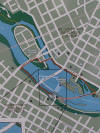|
 
In the spring of 2001 the water roared from the
north and the Mississippi river rose. The April spring floodwaters came
through Minneapolis and made a great spectator show.
Running across the river south of the Hennepin
Ave bridge you find the old Stone Arch Bridge. The Union Station,
home to the Chicago Northwestern and Great Northern railroads of a bygone
era, has been demolished. The tracks to
the station used to cross the river over the
 Stone
Arch Bridge but now the tracks are gone also. Stone
Arch Bridge but now the tracks are gone also.
 I
used to stand at the Union Station and look out the window, one foot on a
steam valve of the radiator beneath the window. My father commuted to
Chicago via rail and on Friday evening we would go to meet the train. If I
leaned far over and pressed my 8 year old face to the glass, I could see
the train approaching winding across the bridge. I then had enough time to
dash down the grand staircase to the lower level and stand on the platform
as the Chicago Northwestern "400" was announced on the PA system and
pulled into the station. I
used to stand at the Union Station and look out the window, one foot on a
steam valve of the radiator beneath the window. My father commuted to
Chicago via rail and on Friday evening we would go to meet the train. If I
leaned far over and pressed my 8 year old face to the glass, I could see
the train approaching winding across the bridge. I then had enough time to
dash down the grand staircase to the lower level and stand on the platform
as the Chicago Northwestern "400" was announced on the PA system and
pulled into the station.
Pedestrians and rubber wheel trolleys now use the
bridge and the bridge has become an excellent vantage point for the view
of the river.

  
Across Hennepin avenue to the south from the old
site of the Union Station the post office still stands.
 The
lower level used to have docks and rail and truck facilities for off
loading the mail of the upper Midwest. The
lower level used to have docks and rail and truck facilities for off
loading the mail of the upper Midwest.
The St Anthony Falls area between the Hennepin
Ave bridge and the Stone Arch bridge still has the upper lock for barge
traffic.
 In
the spring before the barges start coming up the river from St Louis and
other river cities of the south, the gates are opened and the water roars
through. Relieving some of the pressure on the St Anthony Falls and dam,
the water cascades and the In
the spring before the barges start coming up the river from St Louis and
other river cities of the south, the gates are opened and the water roars
through. Relieving some of the pressure on the St Anthony Falls and dam,
the water cascades and the
 spray
mist hangs above the falls and drifts to the spectators watching from
above. spray
mist hangs above the falls and drifts to the spectators watching from
above.

 The
Corp of Engineers has an The
Corp of Engineers has an
 observation
post for no charge to give history of the
area and show the
workings of the lock. It is fun in the summer to watch the barge traffic,
the paddle wheel excursion boats and all the recreational traffic of the
river that use the lock. observation
post for no charge to give history of the
area and show the
workings of the lock. It is fun in the summer to watch the barge traffic,
the paddle wheel excursion boats and all the recreational traffic of the
river that use the lock.
 
Edited
Sunday, 22 August 2010
|